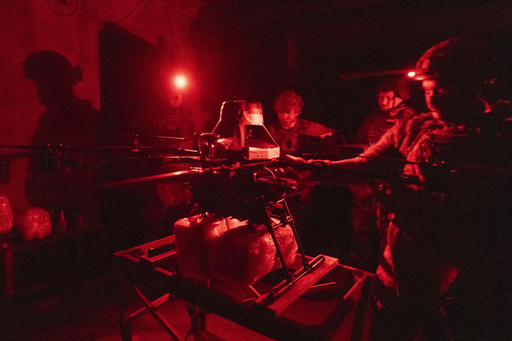
KHARKIV REGION, Ukraine — In a unique approach to supply delivery, members of Ukraine’s Khartia brigade are utilizing four drones originally intended for bomb delivery. Instead, they have repurposed these unmanned aircraft to transport essential supplies such as food, water, and handwarmers to their comrades stationed on the frontlines. Piloted by a commander known only by the callsign Kit, these drones are launched discreetly from what he humorously refers to as their “Airbnb,” located in a basement. Guided by night vision cameras, Kit drops packages weighing around 10 kilograms (22 pounds) close to where up to five infantry soldiers are engaged in battles against Russian forces, providing crucial support that can sustain them for two to three days.
Kit expresses his narrowed focus on the immediate battlefield situation rather than the broader political implications of events like the forthcoming reelection of Donald Trump. He acknowledges the potential changes it may bring but emphasizes that, for him and his troops, the pressing concern is the very real, tangible movements of Russian forces in their sector. “We are trying with all our might to destroy them and win back our territories, so that it does not go any further, so that there are no more destroyed cities and destroyed lives,” Kit explains. He emphasizes the importance of concentrating on the present and doing everything possible to protect what remains of their land.
Yet, there is a palpable sense of increasing tension in the air. The Kharkiv region has been facing intensified strikes from Russian forces, including advanced glide bombs and drone swarms that are demolishing infrastructures. Russian troops are also making gains in the neighboring Donetsk and Zaporizhzhia areas. Recent intelligence reports indicate that as many as 12,000 North Korean troops have been deployed to Russia’s Kursk border region to bolster defenses against advancing Ukrainian forces.
Amid the unfolding situation, there are critical discussions involving global leaders, which include American political perspectives on the Ukraine conflict. Trump, having previously characterized Ukrainian President Volodymyr Zelenskyy as an incredibly persuasive advocate for U.S. aid, has also praised Putin regarding his actions in Ukraine. Zelenskyy, who was among the first to congratulate Trump, highlighted their discussions aimed at addressing Russian aggression during a September meeting.
The current U.S. administration has declared its intention to maximize support for Ukraine before Trump’s inauguration on January 20. This assistance aims to bolster Ukraine’s defensive capabilities against Russian advances and strengthen its position in potential peace talks. However, the urgency is underscored by Russia’s relentless push for territorial gains in what many view as crucial weeks ahead.
A Khartia soldier known as Aviator, who is responsible for launching the supply drones, remains focused on completing his missions successfully. He watches the clock closely, knowing that with the coming dawn, the risk of Russian forces detecting and targeting the drones increases. For Aviator, the stakes are personal; he understands that failure could have dire consequences for his comrades, whom he refers to as brothers. “You feel you’re useful, that you are in the right place, that the lives and health of our brothers depend on your work,” he reflects, noting that he returned from Poland to join the military, leaving little room for distraction by political events.
Nearby, Tolstiy, a former infantryman who now operates a drone repair workshop, speaks to the reality of Russian occupation. He vividly recalls the fall of Bakhmut, a city he fought to defend, describing the emotional toll of seeing his fellow soldiers injured or killed. Confronted with this harsh reality, he finds motivation in the duty to carry on. “It’s like we’re in another world here,” he remarks, highlighting the profound impact of his experiences on his determination to fight.
